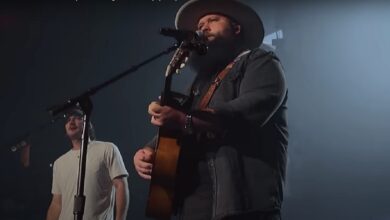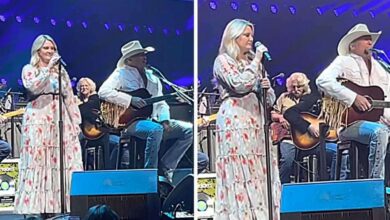Struggled To Speak, But Sang Oh, My. 46 Years Later, It Remains Impactful
Elvis Presley, a cultural icon and one of the most influential figures in music history, passed away on August 16, 1977, at the age of 42, marking the end of an era in popular music. His death came after a prolonged struggle with prescription medication and alcohol abuse, which had taken a toll on his health in the years leading up to his untimely passing. The final chapter of Presley’s life was not just about his musical contributions; it was also a period marked by personal trials and tribulations that he faced both publicly and privately.
His final public appearance occurred in Indianapolis, Indiana, on June 26, 1977, less than two months before his death. In the weeks preceding this event, two significant performances were captured on film: one in Omaha, Nebraska, on June 19, and another in Rapid City, South Dakota, on June 21. Both shows were intended for a television special titled “Elvis in Concert.” The special, which aired posthumously, showcased not only Elvis’s performances but also presented an image of a man struggling against the weight of his own fame and physical decline. Critically, it received mixed reviews, and many expressed disappointment in how it portrayed Presley’s deteriorating condition, leading to the unfortunate moniker of “Fat Elvis.”
The concert in Rapid City included a poignant moment as Presley performed “Are You Lonesome Tonight?” His introduction of the song was notably introspective, where he expressed, “This one is called Are You Lonesome Tonight? I am, and I was.” This personal touch resonated with fans, revealing the depth of his struggles at that time. While his physical condition had visibly affected his performances, Elvis’s voice still retained its soulful timbre, allowing him to connect deeply with his audience despite his challenges.
Even as he faced evident struggles with the spoken parts of the song, his vocal prowess remained intact. His ability to convey emotion through music was clearly demonstrated, showcasing both vulnerability and strength. One could hear echoes of laughter and playfulness in the early staging of the concerts, interspersed with moments of clarity and nostalgia. In stark contrast, the later stages would show signs of a more subdued performer, tackling the complexities of aging, fame, and pressure.
Reflecting on personal challenges, including his 1973 divorce from Priscilla Presley, one cannot help but consider the weight of his emotional struggles during these last performances. Many have noted how these elements interplayed within his music, transforming his songs into narratives of love, loss, and longing. The emotional impact of Presley’s final concerts resonates deeply with fans to this day. His performances elicited profound reflections, with many noting how his once-strong stage presence began to wane, manifesting a poignant sense of yearning and nostalgia in his renditions.
Jerry Schilling, a close confidant of Presley, shared insights regarding the decision to film “Elvis in Concert.” In his memoir, he recalled how discussions about Presley’s health took place but emphasized that it was ultimately Presley’s choice to proceed with the project. It highlighted his dedication as an artist and a desire to connect with fans, showcasing the complicated relationship he had with his career and public persona, even as he battled personal demons.
Despite the challenges that marked his later years, Presley’s legacy experiences a continual resurgence through his music and the emotions that his performances evoke. The juxtaposition of his fading physicality against the power of his vocals left audiences with a dichotomy that is difficult to reconcile, ultimately underscoring the complexities of fame and the human experience. Commentators on platforms like YouTube often pay homage to this legacy, reflecting on moments etched in time, wherein his voice served as a bridge connecting generations of fans.
Presley’s impact on popular culture remains profound. His ability to connect with listeners through timeless ballads and rock ‘n’ roll anthems continues to influence artists across genres. As a pioneer of the music industry, he melded various styles, from gospel to country, giving birth to a sound that attracted a diverse audience. The sway of his hips, the curl of his lip, and the intensity of his performances redefined the boundaries of how a performer could engage with an audience, laying the groundwork for future generations to innovate and explore.
Elvis Presley’s story is one of triumph and tragedy, a legacy shaped by incredible talent dulled by personal struggles. The emotive chords of his music echo through time, inspiring countless artists and touching the hearts of millions. Each note carries with it a fragment of his journey—a tapestry woven with passion, spirit, and the inherent complexity of being human. His influence is not simply a relic of the past; it is a living testament to the power of music as an eternal form of expression, capable of transcending the struggles faced by its creator. As we reflect on Presley’s life and artistry, it is clear that while he may be gone, his spirit and contributions to music will forever remain a vital component of the cultural landscape.
&ab_channel=rosikalau





